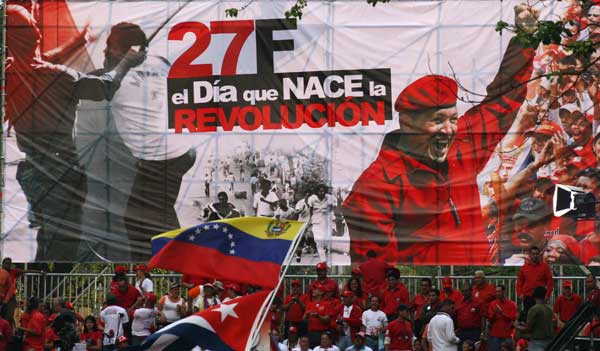

This month marks the 30th anniversary of the “Caracazo” — a spontaneous uprising of the poor in Caracas, Venezuela, which lasted for days and had a tremendous impact on all layers of society.
In February 1989, Caracas was a modern city of high-rise apartment buildings and well-stocked stores, which catered to an affluent upper class who enjoyed the fruits of Venezuela’s oil wealth. They were cosmopolitan and could afford to see the world. To American and European tourists and oil functionaries, Caracas was a delightful place, close to the Caribbean Sea but cooled by its 3,000-foot elevation in the mountains.
But tucked in and around the capital were impoverished neighborhoods where hungry people barely eked out an existence from day to day.
Many low-paid workers, priced out of the city, lived in surrounding areas and relied on buses to get to their jobs. Others lived inside the city, but were too poor to enjoy any of the benefits of urban life.
Then the government announced it would raise bus fares.
Hunger brought people to boiling point
That was the last straw. While the wealthy could zip around in their high-end imported cars, those living on the edge had to choose between food and getting to work.
The fare increase led to an outburst of fury. Hungry people of all ages broke into stores and took whatever they needed or could drag home. At first it was food, but as the rebellion broadened, the stores were emptied of everything that could be carried away.
The Caracazo, or “Caracas smash,” revealed the deep chasm between the social classes in Venezuela and showed — as the government mobilized the police and then the military to put down the rebellion — that these bodies of armed men existed to protect the property of the rich and put down any challenges to the status quo.
Venezuela has the largest oil reserves in the world. The Rockefeller empire, at that time called Standard Oil, began exploiting them in 1921. The Venezuelan government nationalized this valuable resource in 1976, supposedly for the benefit of the people. But at that time little changed for the hungry poor in Caracas.
U.S. oil companies suck out Venezuela’s wealth
By the early 1990s, changes in the nationalization law had allowed U.S. companies like ConocoPhillips and ExxonMobil (originally Standard Oil) to regain effective control of Venezuela’s oil reserves. But even before the law was changed, the Caracazo had shown that this great wealth was benefiting only the few and not the many.
At the time of the Caracazo, Hugo Chávez was an officer in the Venezuelan army. Born into a working-class family, he sympathized with the plight of the workers and poor. He and a number of fellow soldiers had formed a secret organization within the military, known as the Bolivarian Movement 200, to spread revolutionary ideology among their peers.
The Caracazo of 1989 signaled to them that the masses were ready to rebel, and they must either try to take power or be used against the people.
On Feb. 4, 1992, Chávez and a group of his fellow officers led an attempt to overthrow the government of President Carlos Andrés Pérez. It failed, and Chávez agreed to surrender — but on the condition he be allowed to address his fellow officers on national television. He told his comrades that regrettably — “for now,” he said — their goal of taking power could not be accomplished.
Chávez spent two years in jail, and he emerged in 1994 as a hero of the people. He formed a new political party, and in 1998 he was elected president of the country with 56 percent of the vote. He continued to be re-elected until his death, when he was succeeded by former bus driver and union leader Nicolás Maduro.
Today, after years of attempting to drown the Bolivarian Revolution through economic sanctions and direct sabotage, the U.S. imperialists, who have fattened for almost a century off Venezuela’s oil, are trying to carry out a right-wing coup that would turn back the clock to the days of total rule by a hated U.S.-backed oligarchy.
And the hypocritical imperialists claim they are doing it to end hunger.
Download the PDF Farmworkers organize three-day strike Palestinian factions demand an end to the famine…
In the more than 650 days since the Al-Aqsa Flood (October 7, 2023), a remarkable…
Special to Workers World Hosted by Panda Aid (China) and co-organized by the International Action…
The following statement summaries were posted July 18, 2025, on Resistance News Network. Palestinian factions…
“What hypocrisy that the maker of F-35 fighter jets, attack helicopters, missiles and bombs that…
At 10:20 a.m. on July 10, some 500 community supporters responded to a Rapid Response…